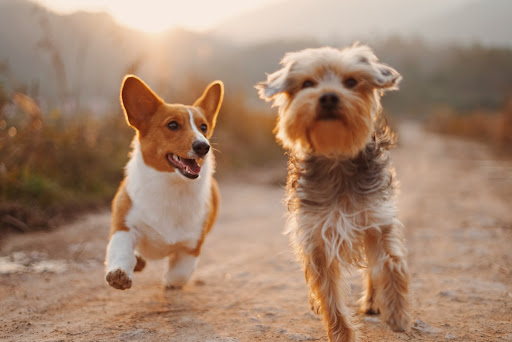Table of Contents
Socialization | Genetics | Abuse | Territorial | Fearful Behavior | Illness or Injury
Summary:
Do you have an aggressive pup? You know, the one that barks their head off at passersby and lunges whenever they see another dog? It can be unnerving, not to mention embarrassing!
But fear not—there is hope for your hound. In this article, we'll discuss 6 potential reasons why some dogs display aggression, as well as what you can do about it.
From exploring a lack of exercise to examining breed type, let's demystify these reactions and learn how to turn those growls into healthy, friendly behavior. Read on for the tips (and tricks!) you need to help improve Fido's demeanor!

1) Lack of Socialization
Have you ever noticed how some timid dogs tend to be more aggressive and anxious compared to their outgoing counterparts? Well, it turns out that lack of socialization could be the culprit. Just like how humans need social interaction, dogs require positive experiences with people and animals to help them develop a healthy sense of confidence and trust in the world around them.
When exposed to new situations, dogs that are well-socialized tend to take things in their stride as they have learned to adapt to different environments. Conversely, dogs that lack socialization may become overwhelmed, leading to anxiety, fear, and ultimately, aggression.
So, while it may take some effort and time, it's essential to expose your furry friends to new experiences and people to help them become happy and confident companions.
2) Genetics
Hey there! Have you ever wondered why some dog breeds are more likely to be aggressive than others? Well, it turns out that their genetic makeup plays a big role in this behavior. Breeds like pit bulls are often branded as aggressive due to their genes.
However, it's important to note that genetics is just one factor among many that contribute to a dog's temperament. Socialization and training also play a crucial part in shaping a dog's behavior. So, let's not be too quick to judge a dog based solely on its breed.
After all, all dogs deserve a chance to be judged as individuals, just like us humans.
3) Abuse or Neglect
It's heartbreaking to think that there are dogs out there who have suffered abuse or neglect. Unfortunately, those experiences can have lasting effects on a pup's behavior.
For some, aggression becomes a learned response that helps them feel safer in scary or unfamiliar situations. It's definitely a sad reality, but it's important for us as pet owners to understand and be patient with these dogs.
With the right care and training, even those who have experienced trauma can learn to trust and feel safe again.
4) Territorial Behavior
Territorial behavior is a common trait in dogs, and it's not always a cute one. When a dog feels like their space is being invaded, they can become aggressive and even dangerous. It's important to be aware of your dog's territorial instincts and do your best to prevent any tense situations.
This might mean keeping your dog away from unfamiliar animals or people or providing them with a designated space that they view as their own. By understanding your dog's behavior and taking preventative measures, you can ensure a happy and safe home for both you and your furry friend.
5) Fearful Behavior
Have you ever encountered a fearful dog? It can be a nerve-wracking experience. When a dog feels threatened, scared, or intimidated, it may respond with aggression as its defense mechanism.
This behavior can be alarming, but it's important to remember that the dog is simply trying to protect itself. It's crucial to approach a fearful dog with caution and avoid making sudden movements or loud noises that could further trigger their anxiety. Both anxiety and aggression can be caused by various factors, but they are usually the result of stress and fear. For example, CBD oil for dogs with anxiety and aggression can help reduce stress and fearfulness, which can ultimately lead to a decrease in aggression. With patience and effort, owners can help their dogs overcome their fears through positive reinforcement and training. So remember, don't be quick to judge a dog's behavior - they may just be scared and in need of a little extra love and attention.

6) Illness or Injury
Have you ever noticed that when your furry best friend is feeling under the weather, they may be more on edge? Dogs in pain or discomfort can become more protective of themselves and lash out if they feel threatened by someone near them who could make the pain worse.
It's important to understand that this behavior is not because they're trying to be aggressive or mean, but rather a natural response to protect themselves. So next time you notice your pup acting out of character, try to approach them calmly and with care, giving them some extra love and attention during their healing process.
Final Thoughts
Understanding why and how dogs become aggressive can hopefully help us in our efforts to create a more positive, nurturing relationship with these beloved creatures. By practicing patience and respect during interactions with dogs – and other animals – we can do our part in minimizing the amount of aggression they face in their lives.
It's important to remember that all animals, no matter breed or background, have individual personalities and responses which must be taken into consideration. Veterinary care is always key for maintaining their physical health; however, emotional well-being should not be forgotten either.
If it seems that a dog is consistently aggressive even if there are no apparent triggers, seeking the advice of an animal behaviorist may be beneficial in healing or managing any underlying persistent issues.
- Update on Behavioral Genetics by Karen Overall
- A Behavioral View on Dog Aggression, Barbara Nibling
- American Temperament Test Society
- ASPCA
- Owner-Directed Aggression in Dogs' J. Fat, M. Amat, X. Manteca; Unitat de Fisiologia Animal, Facultat de Veterinaria
- Clinician's Brief; Dinwoodie IR, Zottola V, Dodman NH. An investigation into the effectiveness of various professionals and behavior modification programs, with or without medication, for the treatment of canine aggression. J Vet Behav. 2021;43:46-53.
